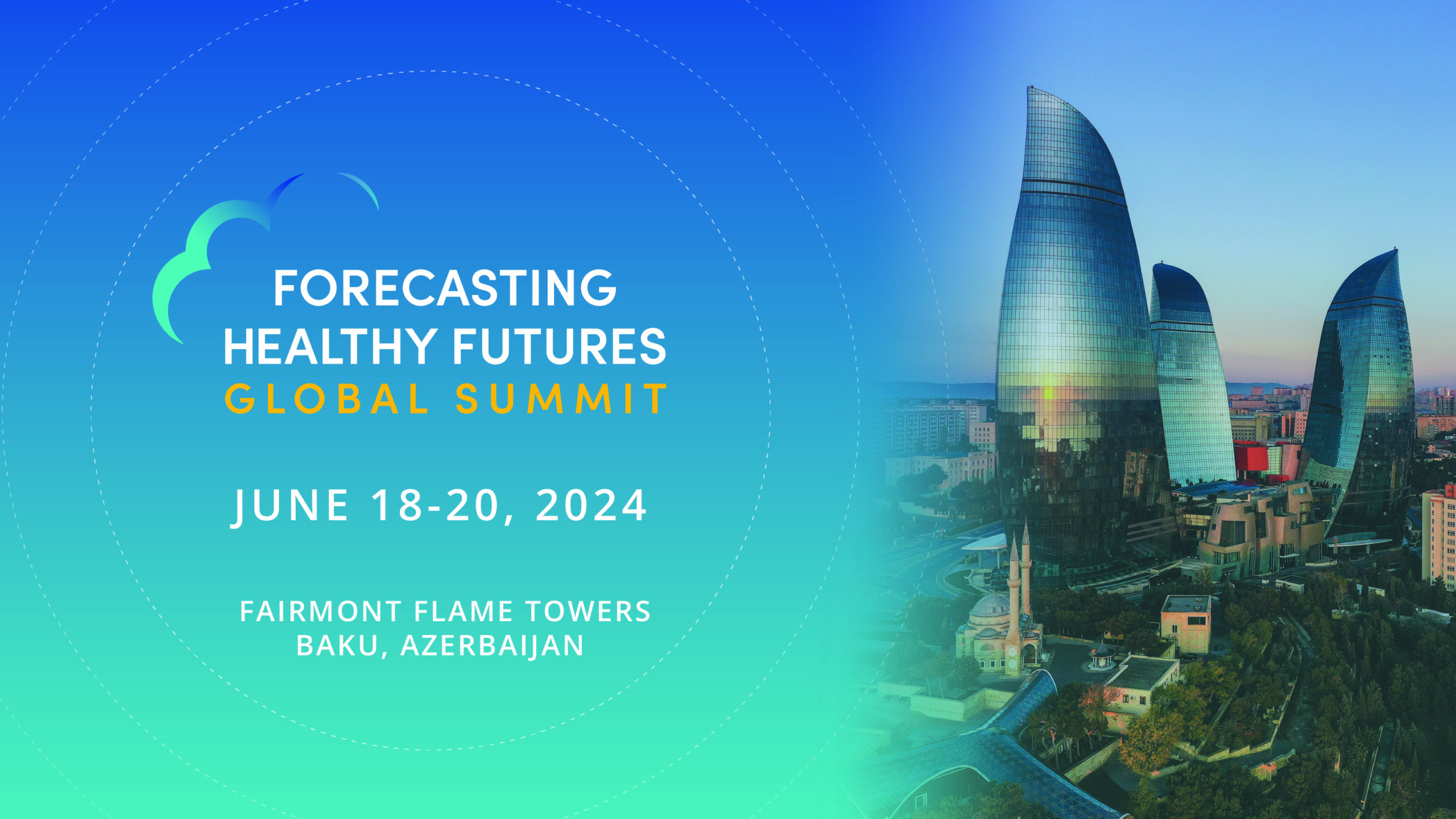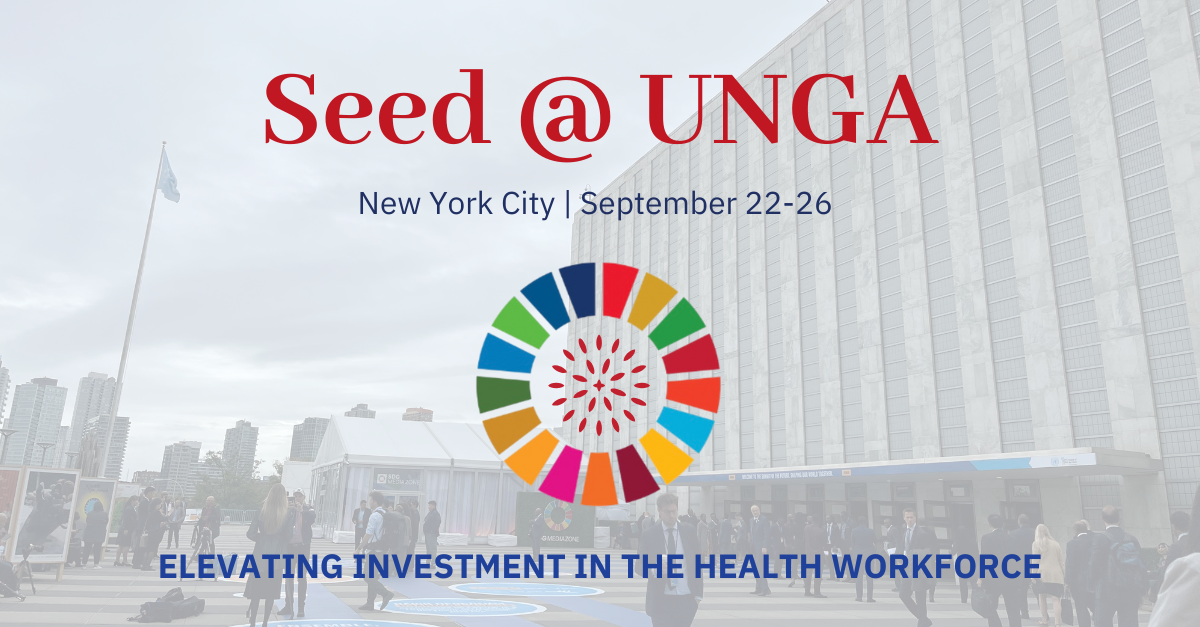
Dr. Vanessa Kerry’s opening remarks at the Forecasting Healthy Futures Summit 2024
Our CEO delivered an inspiring call for action on climate change and health at the 2024 Forecasting Healthy Futures Summit in Baku, Azerbaijan
Dr. Vanessa Kerry
June 18, 2024
REMARKS AS DELIVERED
It is a honor to join you this morning and I am incredibly sorry I cannot be there in person.
The discussions of this conference are among the most important of our lifetime. And setting the agenda and mobilizing the action we need for a healthier future is paramount.
We have been making progress. 30 years ago we started on the critical discussions about climate and our collective responsibility.
At Kyoto we saw the first legally binding limit on greenhouse gas emissions. In Copenhagen we saw a commitment to keep temperature rises below 2 degrees celsius.
The momentous Paris Agreement mapped out a vision towards a net zero future. Advances in technology are forging solutions for mitigation and we are waking, finally, to the need to rapidly build our resilience to the changes that have already occurred.
However, despite these best efforts of our leaders, scientists, and entrepreneurs, our global response to climate change is still falling short and it is in danger of failing outright.
Greenhouse gas emissions and global temperatures have continued to rise. And 2023 was the hottest year on record – so far.
Scientists have sounded the alarm that we are slated to break through the 1.5 target in the next five years.
This is not an arbitrary line in the sand. Today, at around 1.3 degrees celsius above pre-industrial levels, we are already feeling unprecedented and striking challenges.
Extreme weather and heat are taxing populations,
we are losing livelihoods and lives and
climate change is challenging our health, economies and security.
Decades of inaction and self-interest have led us to this moment. And… as a global health community, we have a huge responsibility to ensure more lives are saved and to change this perilous course.
I believe we can be the critical levers of change we need to accelerate reducing emissions, adapt to climate change – and save lives. By fully illustrating the health impacts, we can significantly shift the balance towards a rapid and just transition.
That’s why it is imperative we continue the momentum forward from to COP29 from COP28.
COP28 was historic and a critical inflection point. It heralded the necessity to phase out from fossil fuels and was a huge moment for the health community with the first ever day of health.
COP28 created a deeper understanding…
- That the impacts of climate change are being felt most keenly by those least able to limit its impact;
- That, the world is changing much faster than we thought; and
- That climate change is having profound impacts on our health, economy and equity.
We must look to COP29 as an opportunity to build on this momentum. Every presidency has the opportunity to set our course better and Azerbaijan can do the same
- by galvanizing unprecedented funding for mitigation, and adaptation and resilience
- and through its commitment to protect and invest in our human capital
This latter priority reflects a truth that climate change is about our lived and human experience.
It impacts our communities, our livelihoods, our politics and policies, our economies – and most of all our health.
There is no way to speak of our future without recognizing our health and wellbeing and how they lie at the centerpiece of everything
Climate change is not just a question of degrees celcius but it is – in truth – about lives lost – or saved if we choose.
The critical question we are grappling with here is how can we collectively make the case for action?
I would argue, first, our response must be multi-sectoral.
A key part of our shared challenge is moving discussions of health outside the health sector itself, and instead into the mainstream of the climate negotiations and our response.
We need to increase the understanding of how climate change-induced health issues profoundly affect and interweave with multiple sectors: so that we can drive the momentum needed for mitigation and adaptation at scale at the same time we focus on mitigation.
There is ample data. The global community though too often chooses to ignore it.
Poor health taxes our economies, plummeting productivity, leading to lost work days, wages and household insecurity.
And investments in health have shown to contribute significantly to GDP growth.
Improved agricultural production bolsters food security and reduces malnutrition.
While clean energy ensures oxygen is available at all times, the lights remain on in the operating theater, and the sterilizers can work. It also means the health sector contributes less to greenhouse gasses.
Training and retaining health workers – which is central to Seed Global Health’s work and heart – are job creation for the growing number of young people in need of work, and gender equity as over 70% of health workers are women. Better health services and healthier populations can lessen pressures to migrate.
So rather than relegating health to a single day at COP29, every thematic day should prioritize the intersection of health with broader global challenges.
Second, we must recognize climate change is fundamentally about people – not only who are impacted but who are on our frontline of defense.
People are pivotal to safeguarding our health and are our best adaptation to climate change.
Investing in the health workforce will increase resilience within health systems because health workers are the main line of defense for populations, and countries faced with emerging health threats, including from climate change.
They are our surveillance systems, identifying infectious disease outbreaks when they first occur. They protect our populations through screenings and vaccinations, or manage the growing burdens of non-communicable disease, rising mental health challenges, and meet the now rising maternal and child health burdens we see.
They are our front line of care, education and advocacy – they are our health systems and can triage and know best what interventions and investments are needed to save the most lives in the fastest way possible.
There is no path forward without the people who uphold the system.
Third, our approach to this challenge must be a joint and accelerated effort by both the public and private sectors.
We need the public sector to step up with courageous leadership, and bold policies that protect our future.
We know it’s possible. We have a prior history of nations coming together at scale to solve big problems and protect lives – whether it was in the wake of World War II or for health when you look at the WHO Framework Convention on Tobacco Control. It was one of the most quickly ratified treaties in U.N. history and has been instrumental in saving lives and reducing smoking rates around the globe.
Climate change is admittedly a much bigger issue but its impact on our lives is as well. Our leaders must have the courage to exercise smart policy, innovative incentivization and even law, when needed, to help address the crisis.
And it is incontrovertible that to accelerate change, foster innovation, and secure urgent funding, we must engage the private sector by building a compelling business case for investments in emissions reduction and adaptation measures. A focus on health, and all the ways it weaves through the sectors, can be the key to unlocking this.
If we align the interests of the private sector with public goods, for example the impact of extreme heat on the health of their workforce, we can make the business case for the private sector to act and accelerate the change we need to see.
And finally, we must recognize that health systems strengthening is one solution for the many problems we face.
We must stop parsing – our siloed approach to global health has not built the resilience needed for the existing burdens of disease we face, let alone the challenges coming down the pipeline from climate change and others.
If we make the threshold investments needed in systems strengthening, we will be able to realize the outcomes we have fought for forty years to achieve – for the billion we have put into global health we can actually be transformational. These investments can be our drive towards Universal Health Coverage, a strategy to address burdens of NCDs, our pandemic preparedness – and they are our adaptation against climate change.
Our response to this moment must be multisectoral, people-centered, a joint effort between public and private sectors – with a laser-like focus on health systems strengthening.
It is our responsibility – otherwise lives will continue to be lost and our future at risk
As we look ahead to this year’s COP, and all the moments in between, there is a tremendous opportunity to influence discussions which will ultimately decide our future and of every single person around the world.
We have to prioritize health! Let us do that for COP29, every day before then and every day after.
Thank you.

